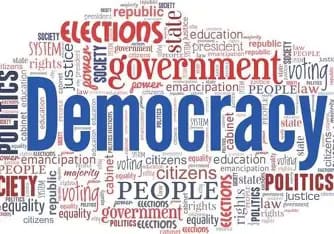‘Democracy is equally evil. Look at the American democracy which resulted in a dictator named Donald Trump, who whimsically imposes tariffs, took control of the D.C. police department, and doesn’t know what he’s doing inside America. What do Americans do, at least until the end of his term?’
‘OK, you are angry about Trump, but why blame democracy?’ I asked.
‘What’s the difference between democracy and a dictatorship if both result in mad dictators? You always advocated for democracy,’ he responded to me.
‘I never said democracy is ideal. My point is, democracy is a lesser evil,’ I answered simply, although I didn’t want to argue with him anymore. Many a time, we debated whether our ancient monarchy system was good or if the present democracy is. He supported the Sanatani monarchy system that generated kings like Lord Ram, a system where the people did not have to worry, as a just king would always be in power.
But I’ve always found his argument flawed. A king like Lord Ram is a mythical ideal, a rare exception to the rule. For every just and benevolent king, history is littered with countless examples of cruel, tyrannical, and incompetent rulers who were a curse upon their people. In a monarchy, there is no recourse for the public against a bad king. The only way to remove him is through rebellion, which often leads to bloodshed and chaos. The people are at the mercy of one person’s whims, with no voice or power to challenge his authority.
However, coming back to the democracy debate, democracy is never ideal. But it’s a lesser evil because it has the power to self-correct. A government is chosen for a particular time frame, so the public has a say whether to repeat the government or replace it. Democratic systems have a balance of power along with a lot of checks and balances.
But then, any system can be manipulated, any law can be misinterpreted, and any power can be misused. The correction may take time, but it must eventually be corrected. Let me give some examples in the Indian context.
Indira Gandhi imposed the Emergency in India by taking advantage of a provision in the Constitution. The public suffered, but eventually the Emergency ended. The Supreme Court and Parliament took measures to ensure there couldn’t be any repetition of such an imposition.
Article 356 was misused for decades to oust elected state governments. Then, the Supreme Court finally interfered, and provisions were made to ensure the central government couldn’t depose any state government at its whim. Similarly, there was no rule for convicted politicians leaving their ministerial posts. The provision later came that anyone who is convicted for two years or more automatically forfeits their election.
Let’s take a recent issue on Constitutional morality. Earlier, when a minister or chief minister was arrested, whether due to a valid reason or political vendetta, they used to resign pre-arrest. Hemant Soren did that last time. But then, Arvind Kejriwal took advantage of the Constitution’s lack of a written provision on constitutional morality and governed Delhi from jail. Subsequently, a Constitutional amendment for automatic resignation after 30 days of jail is being processed in Parliament.
That means there will always be issues, but democracy also has the proper provision to amend such political adventures.
Now, going back to Donald Trump’s case. He invoked the International Emergency Economic Powers Act (IEEPA) to impose tariffs. Whether that’s wrong or right will ultimately be adjudicated in American courts. Already, two courts have ruled that some of Trump’s tariffs are illegal, and the case is headed to the American Supreme Court. Similarly, his move to federalize the D.C. police has been challenged in court.
So, the bottom line is that democracy, though not an ideal solution, is a lesser evil because there are countermeasures to amend the misuse of power, although it may take some time. Unlike a monarchy, where a corrupt or dictatorial king can remain in power until death, a democracy’s system of checks and balances ensures that even a powerful leader can be held accountable, and the system can self-correct.


